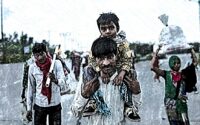TANZANIA CASE: A REFUGE OR PERIL
This article has been written by Vijeta and curated by Himanshu Raj of Chanakya National law University.
Introduction
The article finds its roots in the incidents that have recently taken place in Tanzania where Burundian refugees are reportedly alleged to have disappeared and tortured. It is also reported that 18 of these refugees were brutally abused and the whereabouts of several others still remain unspecified. In the last of 2019 and starting of 2020 the Tanzanian Police and Intelligence is said to have forcefully disappear, torture, arbitrarily detain about 11 Burundian refugees and caused involuntary return of others to Burundi where they were arrested without any charge. Since January 2020 refugees and asylum seekers are constantly reported being arrested from Mtendi and Nduta camps near Burundi border.
Preface
Tanzania was supposed to be one of the most generous refugee hosting countries of the world at a time, where in total 335000 refugees from different parts of Africa took asylum. However, the 2015 elections in Burundi flashed a widespread insecurity and a new influx of Burundian refugees in Tanzania who now create a majority of refugees in the country. Three decades ago there were one million refugees in Tanzania and after the civil war in 90’s between Hutu and Tutsi ethnic groups, hundreds of thousands of more people fled to Tanzania. Most of them eventually returned or received citizenships but some still live in camps and those who do are compelled to have a life of misery and unstopped agony as they have restrictions on movement, they cannot work or trade and also cannot go to school. Tanzania has clearly prompted that it will prioritize returning the refugees to their home countries and the strict encampment policy they have is a part of this. It has already withdrawn from the Comprehensive Refugee Response Framework, an initiative by the UN to find solutions for refugees, which only makes the life of refugees in camps more difficult.
Contextual Background
Around 1, 63,000 Burundian refugees live in Tanzanian camps due to constant civil agitations and disputes in their country. And the Tanzanian Govt. has been regularly pressurizing them to return. These refugees always live in the fear of arrests, violence, detentions and involuntary deportations as Tanzania has also restricted the interference of the UN Refugee Agency to keep a check on pressurized involuntary returns. On October 11, 2019 when the Tanzanian President stated that Burundian refugees should “GO HOME”, the officials started specifically targeting the parts of Burundian refugee population who were already vulnerable. The stories from the refugees are even more terrifying, they have to deal with insecurities, police abuses and involuntary deportation threats. It is due to these constant threats that they sometimes run away to some other countries like Uganda. Their reason to leave Tanzania includes the fear of getting arrested, disappeared or killed in the refugee camps. The life of refugees in these camps is no more than a dungeon as the Tanzanian government has closed and destroyed the local markets, these refugees are not allowed to earn a living or get education and even the freedom of movement is also restricted. Some refugees cite the lack of basic resources, services and amenities in the camps as well. In short, the refugees are not considered more than some chattel purchased for slaughter.
The UN and Tanzania’s stand on Burundian Refugees
The 1951 Refugee Convention and The 1969 African Refugee Convention prohibit the deportation of refugees if they have a threat to their life and freedom. Keeping a note of it an agreement was made between Tanzania, Burundi and the UN that UNHCR will interview the ones returning to check whether it was voluntary or not and the number was decided to be kept below 2000 refugees per week, however the countries ignoring the guidelines by the UN in August 2019 entered into a separate agreement that stated “All the refugees are to return to the country of their origin whether voluntarily or not”. This agreement clearly violates the international legal prohibition against REFOULEMENT, the forceful return of a refugee leading to torture, persecution and threat to life. The UN states refoulement not only occurs when a refugee is unwillingly deported but creating the scenarios where it is impossible for him to sustain and he is compelled to go back to a place he left for saving his life, is also a form of refoulement which precisely is what is alleged in Tanzania.
Status of Tanzanian Laws and Obligations on Refugees
In Tanzania, the refugee policy distinguishes between “settlements” mainly for housing the 70’s refugees and “camps” for those arriving in the 1990s. Settlements have access to larger plots of land. However, in both cases refugees’ rights to freedom of movement are similarly restricted. In the year1998 Tanzania enacted new legislation, the Refugees Act, which replaced older laws and sought to deal with the country’s obligations pursuant to the signing of the OAU Convention governing specific aspects of Refugees Problems in Africa of 1969 Convention. In addition to seeking conformity with the country’s continental commitments, a secondary objective was set to make Tanzania a less attractive destination for asylum seekers, and sending a deterrent message to authorities in refugee-generating countries. Government policy also encouraged repatriation as the preferred solution. The new legislation intensified restrictions on the rights of refugees in the country and controls on the movement of encamped refugees increased. Although not codified in the 1998 Act, a practice has developed which prohibits refugees from moving outside a four-kilometre radius of their camp.The 1998 Act makes no specific mention of the right of freedom of movement for refugees, however, pursuant to sections 16 and 17, authorities have the power to require any asylum seeker or refugee to reside within a “designated area” (DA) – a euphemism for a refugee camp or settlement. So in all the new enactments and refugee policy completely focuses on returning the refugees to their original country.
Descriptive Profile:
To perfectly implicate their Refugee Policy, The Tanzanian authorities have reportedly enforced the disappearances of the Burundian refugees. The victims and the camp workers who are fearful to disclose identity reveal that the officials are themselves involved in the process. In case a refugee steps out of DA for any reason, he can be sent to camp jail for 3 days or so. A movement permit can only be issued for up to 14 days unless the Director of Refugee Services has specifically allowed a permit for a longer period of time. If the individual fails to comply with the terms and conditions of their permit, they may be guilty of an offence against the Act, and if convicted, can be imprisoned for up to six months or fined fifty thousand shillings or both Victims state being held captive under false charges of possession of weapons, detained for weeks without food, and done sexual assaults. They are kept in a room without electricity and other basic amenities, some also confess being hanged by handcuffs, pierced by bike spokes and rubbed chilli on face and private parts. The torture is so atrocious that they finally implore to go back to Burundi. The officials have also been proclaimed to demand money from the families of the victims. When they are finally deported the Burundian authorities either arrest them or they somehow flee to some other country. Some of such victims eventually reached out to the UN refugee agency as well.
The UNHCR states being deeply concerned about the continuing reports from Tanzania about refugee abuse and therefore has requested the Tanzanian Authorities a full fleshed investigation on the matter and asked to file a written report on the matter to which the later only replies of high level investigation going on but no results received so far. The Tanzanian Foriegn Minister in a speech made a complete denial on “EXPELLING” refugees instead asserted that they merely mobilize to encourage voluntary returns. Nevertheless, the Burundian refugee victims have a different narrative altogether. They mention that most of the disappearances have occurred in the same manner, the Police Officials breach house doors or windows around 3 in the morning pronouncing not to be afraid as its police and then seize men from the houses and whom they take, never return! Alike episodes have taken place in most of the camps and when in the morning the family of the victims inquire about the missing people, the Police denies any patrolling or any of the arrests. One of the victimized females even recognized the police officer of the camp that took her husband and therefore, was threatened with death so she succumbed to silence afterwards. The Burundian refugees in Tanzania thus seem to be surviving under horrific conditions and are constrained to endure the barbaric conduct of the Tanzanian Authorities.
Conclusion
Under the International Law, such a situation is termed as ENFORCED DISAPPEARANCES, where the authorities first deprive a person of liberty and then refuse to acknowledge that deprivation. This is a heinous, inhuman and degrading treatment that the Burundians in Tanzania are bound to suffer with The United Nations is their only hope which must now become more vigilant and proactive to deal with these incidents and should try to create a sturdy International pressure on both the Governments to ratify and strictly follow the International Conventions and their guidelines thereby in reference to the refugees. Also a renewed Tanzanian refugee policy must be launched to respect their international rights to exercise freedom of movement and focusing on promoting local integration. Above all the Government and the people of Tanzania have to understand that no one becomes a refugee by choice, he is a HUMAN who has already lost his home, aspirations and dignity. A refugee is not there to snatch the money, places or the opportunities in a country of refuge; he is there because HE HAD NO OTHER CHOICE! He takes refuge in a HOPE that maybe he can at least survive peacefully and this hope should be treated as an obligation by the Country hosting him.


